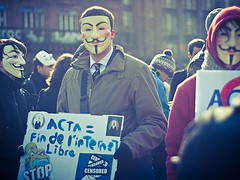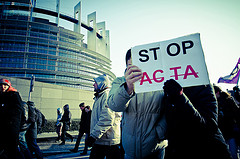As of the end of the month of February 2012, the mobilization efforts of Internet users against the Anti-Counterfeiting Trade Agreement (ACTA) [en] were still going strong. In fact, they may have begun to bear fruit. By including infringements against the author's rights in its scope, this international treaty, which addresses intellectual property rights, also affects Internet content. The ratification debates which were placed on the European Parliament's agenda on February 29, were put on hold in expectation of the opinion of the European Court of Justice (ECJ). The issue of the treaty's conformity with European Community law was brought before the court on 22 February by the European Commission.
Taurillon, the “magazine of young Europeans -France” describes “Europe's about-face on ACTA“:
Si l’avis est négatif, l’ACTA n’a plus aucune chance en Europe. Mais en cas d’avis positif, le recours à la CJUE représente le double avantage de redonner au traité une certaine crédibilité, et de repousser son adoption à une époque suffisamment lointaine pour que la polémique se soit tassée et que l’opinion publique regarde ailleurs.
If the opinion is negative, ACTA no longer
stands a chance in Europe. However, if there is a positive opinion,
appealing to the ECJ would mean a double advantage by giving the treaty a
certain credibility, and also pushing back implementation to a time
that is far enough away when public debate has settled down and the
public's attention is focused elsewhere.
Jérémie Zimmermann, co-founder and spokesperson for la Quadrature du
Net urges on the
European deputies:Les eurodéputés doivent résister à la stratégie de la Commission européenne, qui cherche à gagner du temps et à transformer le débat en une simple discussion juridique, et pour cela continuer à travailler au rejet d’ACTA. ACTA vise à imposer une tendance pour une politique globale du droit d’auteur qui est toxique pour l’Internet libre et pour les libertés. Le Parlement européen est le dernier rempart : il doit agir et adopter une position claire et forte, faute de quoi il laissera le champ libre à la Commission pour imposer une répression inacceptable.
The Eurodeputies must resist the European
Commission's strategy of attempting to gain time and turning the debate
into a simple legal discussion, thereby continuing to work towards
ACTA's rejection. ACTA aims to impose a tendency for a global policy of
author's rights that is toxic for the free Internet and for freedom. The
European Parliament is the last line of defense: it must act and adopt a
firm and clear position, otherwise it will leave the field wide open
for the commission to impose an unacceptable repression.
For trucbuntu,
there is no question of remaining passive while waiting for the Court
to adjudicate:Les citoyens de toute l’Europe peuvent contacter leurs représentants dans les commissions Commerce International (INTA) et Industrie (ITRE), qui se réunissent cette semaine pour discuter d’ACTA, et leur demander de continuer à travailler au sein de leur commission pour le rejet d’ACTA.
Citizens of all of Europe were able to contact
their representatives in the International Trade (INTA)
and Industry (ITRE)
Committees, who met on February 29 to discuss ACTA. Many citizens
requested their representatives to reject the proposal.
The website of the European Parliament explains
the procedure and the issues of the treaty [en] that are under
scrutiny, and has published ‘What
you should know about ACTA‘ [en], a page of questions and answers.
The ACTA workshop of the European Parliament has been the object of a storify [en] made
by the Parliamentary services (link via Global Voices contributor Asteris
Masouras [en]).The organization AVAAZ submitted a petition to the European Parliament on 29 February with 2.4 million signatures against ACTA. The petition is still open:
Nous sommes vraiment proches de la victoire — notre pétition forte de 2,4 millions de signatures a ébranlé les responsables politiques partout en Europe et stoppé les censeurs. La Commission européenne est à présent en position de faiblesse et espère que la Cour de justice donnera son feu vert au traité ACTA en lui soumettant une question juridique très limitée qui recevra certainement une réponse positive.Mais si nous faisons résonner nos voix aujourd'hui, nous pouvons faire en sorte que la Cour examine tous les impacts légaux du traité ACTA et publie un avis qui fera toute la lumière sur cette attaque contre nos droits qu'est ACTA.
We are really close to victory — our petition,
with 2.4 million signatures has shaken up those politicians in charge
throughout Europe and stopped their censors. The European Commission is
currently in a position of weakness and is hoping the Court of justice
will green light the ACTA treaty by bringing before the court a very
limited legal question, that will without doubt receive a positive
response. But if we make our voices heard today, we will be able to get
the court to examine all the legal implications of ACTA and publish an
opinion that will bring to light the real attack against our rights that
is ACTA.
Anti-ACTA parties continue to strengthen their resources. New
protests were set for 10 March, and torrentnews gives a
list, with this appeal:La liste n’est pas exhaustive, n’hésitez pas à nous contacter pour la compléter ;)
si certains se sentent l’âme d’un reporter- photographe en herbe, nous recherchons également des personnes pour faire un petit article photo du déroulement de la manif, rien de bien compliqué, comme fait ici pour Nice, Marseille,Bordeaux et Strasbourg.
The list is not exhaustive, do not hesitate to contact us to complete
it ;)
If any individuals see themselves as budding photojournalists we are also looking for people to do a small photo story on how the protest unfolds, nothing too complicated, as it happens in Nice, Marseille, Bordeaux, and Strasbourg.
For details on the elements of the debate, see also these linked
articles from the Tribune on
February 29, and Myeurop,
on March 3. On Global Voices, see the laws SOPA/PIPA that set a
precedent in the USA, here [en]
and here [en].
Since the beginning of the protests, ACTA seems to have lost a lot of
political momentum.If any individuals see themselves as budding photojournalists we are also looking for people to do a small photo story on how the protest unfolds, nothing too complicated, as it happens in Nice, Marseille, Bordeaux, and Strasbourg.
The title of this post is inspired by the end of the article “La liberté sur
Internet : le filtrage de la discorde” which was published by the
Institute of Research and Legal and Information studies and
Communication (I.R.E.D.I.C.). It
puts into perspective Internet blocking and debates the adoption of
ACTA.


No comments:
Post a Comment